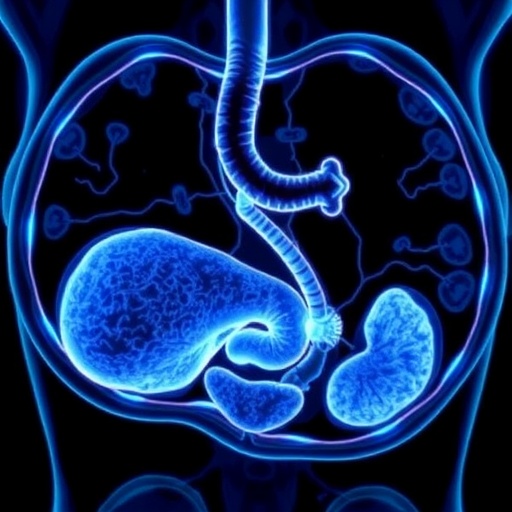In recent years, the role of ANXA2 (Annexin A2) in hepatocellular carcinoma (HCC) has attracted significant attention from researchers and clinicians alike. A groundbreaking study led by Chen et al. sheds light on the multifaceted role of ANXA2 in orchestrating key processes such as tumorigenesis, progression, and the development of therapeutic resistance in HCC. This research is crucial in the realm of personalized medicine, as it highlights potential new pathways for precise targeting and treatment of this lethal disease.
Hepatocellular carcinoma is one of the most prevalent forms of liver cancer and presents a considerable challenge to oncologists due to its aggressive nature and high rate of metastasis. The complexity of HCC development is influenced by various factors, including chronic liver diseases, cirrhosis, and viral infections. The presence of molecular markers such as ANXA2 offers promise not only in understanding the disease’s underlying mechanisms but also in guiding therapeutic interventions.
ANXA2, a member of the annexin family of proteins, is known for its roles in cellular processes, including endocytosis, cell signaling, and membrane trafficking. The recent research underscores the pivotal role of ANXA2 in HCC, linking it directly to enhanced tumor growth and metastatic potential. Increased expression of this protein has been observed in HCC tissues compared to adjacent non-tumorous liver tissues, correlating strongly with poor prognosis in patients.
One of the most compelling aspects of ANXA2 is its involvement in the epithelial-mesenchymal transition (EMT), a critical process whereby cancer cells gain migratory and invasive properties. EMT is a defining feature of advanced tumors, equipping cancer cells with the ability to escape their primary sites and establish secondary tumors. The findings from Chen et al. specifically illustrate how ANXA2 promotes EMT by modulating key signaling pathways such as the TGF-β and Wnt pathways.
The study’s authors further elucidate the mechanisms underlying ANXA2’s role in HCC. It appears that ANXA2 facilitates the activation of matrix metalloproteinases (MMPs), enzymes that degrade extracellular matrix components, thereby allowing cancer cells to invade surrounding tissues. This insight reveals a potential therapeutic target; by inhibiting ANXA2, the invasive capacity of HCC cells might be significantly reduced, opening avenues for more effective treatments.
Additionally, the research emphasizes the connection between ANXA2 expression and therapeutic resistance in HCC. The study demonstrates that elevated ANXA2 levels contribute to the resistance of HCC cells to standard chemotherapeutic agents, complicating treatment regimens. Understanding this resistance mechanism is key for oncologists seeking to improve patient outcomes, as ANXA2-targeted therapies could potentially restore sensitivity to conventional treatments.
Chen et al. also delve into the implications for precision medicine, highlighting how ANXA2 prototyes could serve as biomarkers for patient stratification. Identifying patients who would benefit from ANXA2-targeted therapies could revolutionize treatment approaches, shifting from a one-size-fits-all model to a tailored strategy that maximizes efficacy while minimizing adverse effects.
As the study progresses, it investigates various methods for targeting ANXA2. Potential therapeutic strategies include monoclonal antibodies that specifically bind to ANXA2 or small molecule inhibitors that disrupt its function. Notably, these targeted approaches may offer fewer side effects than conventional chemotherapy, addressing a major concern in cancer treatment.
In parallel, the research reinforces the importance of combining ANXA2-targeted therapies with existing treatments. For example, when incorporating immunotherapies or targeted agents, silencing ANXA2 expression might enhance overall therapeutic efficacy and combat resistance mechanisms. This integration of treatment modalities underscores the need for ongoing clinical trials to assess the effectiveness of ANXA2-centered strategies in HCC management.
The findings discussed evoke a broader conversation about the future of cancer research. With the careful study of specific biomarkers like ANXA2, the field could make strides in understanding and combating other malignancies. This possibility emphasizes the need for ongoing research into the molecular dynamics of cancers beyond HCC, paving the way for comprehensive cancer care that is informed by biological insights.
Moreover, with the advancements in diagnostic technologies and bioinformatics, identifying patients at risk for HCC could lead to earlier interventions. The prospect of implementing routine screenings for ANXA2 levels in high-risk populations presents an exciting avenue for preventive oncology, potentially reducing the incidence of HCC via timely therapeutic action.
Importantly, the research conducted by Chen et al. serves as a catalyst for collaborative efforts among scientists, clinicians, and pharmaceutical industries. The convergence of these groups is vital for bringing novel therapies to the clinic. Their shared goal of eradicating cancer hinges on meticulously translating laboratory findings into practical applications that can save lives.
In summary, the study led by Chen et al. marks a significant step forward in understanding the role of ANXA2 in hepatocellular carcinoma, emphasizing its potential as a therapeutic target and prognostic marker. The research illustrates how targeting this protein could not only enhance treatment efficacy but also pave the way for more personalized approaches to HCC care. As we stand on the brink of new discoveries, the implications for better patient outcomes in the face of HCC are both hopeful and promising.
The exploration of ANXA2 in this context not only deepens our understanding of HCC but also serves as a model for examining other cancers through the lens of molecular markers. Their integration into clinical practice could effectively tailor therapeutic strategies, thereby transforming cancer care as we know it.
Subject of Research: ANXA2 in hepatocellular carcinoma
Article Title: ANXA2 in hepatocellular carcinoma: orchestrating tumorigenesis, progression, and therapeutic resistance toward precision targeting.
Article References: Chen, J., Li, J., Ran, L. et al. ANXA2 in hepatocellular carcinoma: orchestrating tumorigenesis, progression, and therapeutic resistance toward precision targeting. J Transl Med 23, 1104 (2025). https://doi.org/10.1186/s12967-025-07177-9
Image Credits: AI Generated
DOI: 10.1186/s12967-025-07177-9
Keywords: ANXA2, hepatocellular carcinoma, tumorigenesis, progression, therapeutic resistance, precision medicine, biomarkers.
Tags: ANXA2 as a therapeutic targetANXA2 in hepatocellular carcinomacell signaling in hepatocellular carcinomachronic liver disease and HCCcirrhosis and cancer progressionendocytosis and cancer biologyhepatocellular carcinoma progressionliver cancer metastasis mechanismsmolecular markers for liver cancerpersonalized medicine in oncologytherapeutic resistance in HCCtumorigenesis in liver cancer





